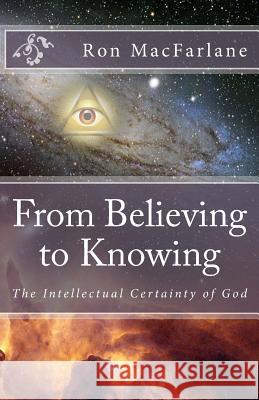From Believing to Knowing: The Intellectual Certainty of God » książka
From Believing to Knowing: The Intellectual Certainty of God
ISBN-13: 9780994007704 / Angielski / Miękka / 2014 / 146 str.
There is a puzzling and pervasive misconception in present-day thinking that the existence of God cannot be intellectually determined and that mentally accepting the existence of God is strictly a matter of non-rational belief (faith). As such, contemplating God's existence is erroneously regarded as the exclusive subject of faith-based or speculative ideologies (religion and philosophy) which have no proper place in natural scientific study. The fact is, there are a number of very convincing intellectual arguments concerning the existence of God that have been around for hundreds of years. Indeed, the existence of God can be determined with compelling intellectual certainty - provided the thinker honestly wishes to do so. Moreover, recent advances and discoveries in science have not weakened previous intellectual arguments for God's existence but instead have enormously strengthened and supported them. Intellectually assenting to the existence of God is easily demonstrated to be a superlatively logical conclusion, not some vague irrational conceptualization. Remarkably, at the present time there are only two seriously competing intellectual explanations of life: the existence of God (the "God-hypothesis") and the existence of infinite universes (the "multiverse theory"). The postulation of an infinite number of unobservable universes is clearly a desperate attempt by atheistic scientists to avoid the God-hypothesis as the most credible and logical intellectual explanation of life and the universe. Moreover, under intellectual scrutiny, the scientifically celebrated "evolutionary theory" is here demonstrated to be fatally-flawed (philosophically illogical) as a credible explanation of life. In this particular discourse, five well-known intellectual arguments for God's existence will be thoroughly examined. In considering these arguments, every attempt has been made to include current contributions, advances and discoveries that have modernized the more traditional arguments. Prior to examining these particular arguments for God, the universal predilection to establish intellectual 'oneness' - "monism" - will be considered in detail as well as the recurring propensity to postulate the existence of one supreme being - "monotheism." Once intellectual certainty of one Supreme Being is established, a number of divine attributes can be logically deduced as well. Eleven of these attributes will be determined and examined in greater detail.











